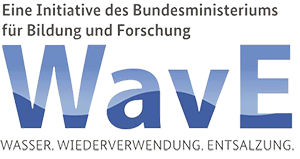innovatION‘s-Update
If the concentration of nitrate, sodium or chloride in groundwater and surface water exeeds the limit set by the German Drinking Water Directive, total desalination is usually used. The fact that selective desalination is also possible and has many advantages is demonstrated by the innovatION joint project funded by the BMBF. In this project, eight partners are working together on a selective desalination process for monovalent ions. In this process, selective membranes are used in capacitive deionization, which allow multivalent ions such as calcium and magnesium to remain in the product water.
By using the selective membranes from FUMATECH BWT GmbH and the Research Group Polymeric Membrane Materials at the Leibniz-Institut für Polymerforschung Dresden e.V. as well as by optimizing the process parameters, it has been possible to obtain up to 10 times higher removal of monovalent ions compared to bivalent ions. This is globally unique! The experiments with the laboratory test plant at the Chair of Process Engineering in Hydrosystems at the Technische Universität Dresden can be used to investigate which membrane materials and which process settings are suitable for selective desalination. The results of the experiments and simulations will be presented at the 13thESEE2023 in Toulouse and at the 10thIWA-MTC conference in St. Louis.
Monovalent ion-selective membrane capacitive deionization (mMCDI) can thus be used for the selective removal of sodium chloride at water utilities such as the Oldenburgisch-Ostfriesischer Wasserverband or for nitrate removal at the Kreisverband für Wasserwirtschaft Nienburg. The evaluation of the online workshop "Requirements for selective desalination in practice" shows that innovative desalination processes such as innovatION's mMCDI contribute to securing the future supply of drinking water and can thus be a key factor in future conflicts of use.
The results of the Group Hydrogeology and Landscape Hydrology of the Carl von Ossietzky University of Oldenburg show that the selectively desalinated water is better suited for groundwater recharge compared to fully desalinated water, since undesired mobilization effects, such as those of arsenic, can be significantly reduced. Groundwater recharge with the partially desalinated water can be used, among other things, in coastal regions to stabilize the groundwater balance, for sustainable groundwater management and to counteract saltwater intrusion. These and other results were presented at EGU23 in Vienna.
In summer, the pilot plant will be set up by DEUKUM GmbH and elkoplan staiger GmbH on Langeoog at the Oldenburgisch-Ostfriesischer Wasserverband to test the innovative process under real conditions. The extent to which scaling and fouling influence the selective desalination process will also be investigated. Work is also being carried out on a stable, low-maintenance and energy-efficient process operation.
In addition, the Chair of Business Administration, esp. Sustainability Management and Environmental Accounting of the Technische Universität Dresden is working on the sustainable evaluation of the process. This involves evaluating not only the desalination process, but also the various material flows during the manufacturing process or when cleaning of the desalination plant.
At the innovatION project meeting in May 2023 at FUMATECH BWT GmbH, the results of the subprojects were presented. The company presentation as well as the subsequent plant tour of FUMATECH BWT GmbH showed the high economic potential of the production of innovative ion exchange membranes in Germany. The ion exchange membranes produced in Bietigheim-Bissingen are used worldwide for various electrochemical processes, including hydrogen generation and storage, battery production, and CO2 storage and utilization. Monovalent ion-selective processes such as those from innovatION can play a crucial role not only in water treatment, but also in the future in the recovery of valuable materials such as lithium.
You can find the complete Newsletter from WavE here:
bmbf-wave.de/Publiktion/Newsletter.html



